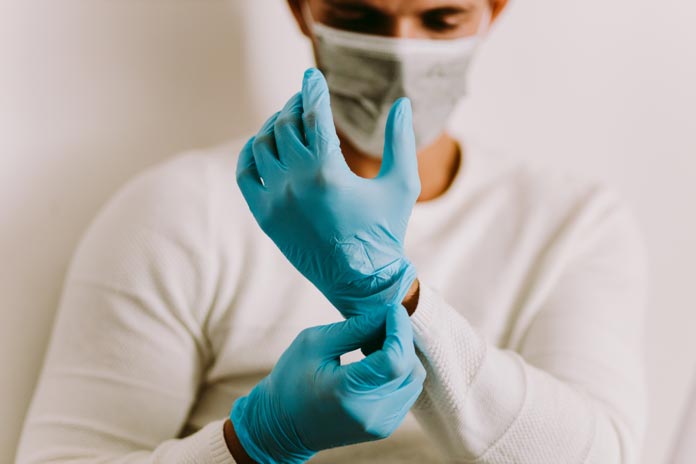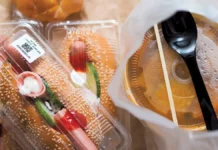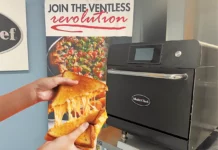
Article by Francine L. Shaw, President of Savvy Food Safety, Inc.
Ever since a foodborne illness outbreak at a Jack-in-the Box put food safety on the map in 1993, food service businesses have been following important food safety protocols.
Food safety “basics” include holding foods at proper temperatures, avoiding cross-contamination, conducting regular inspections, cleaning the facility often, training employees regularly, conducting inspections, and ensuring compliance. Some food service businesses consistently do an outstanding job following these food safety rules, while others are less compliant, risking foodborne illness outbreaks, norovirus, and other food safety breaches. Now, COVID-19 has caused every food service business to add another layer of safety protocols to their routines, and it’s absolutely essential that every employee, across every shift, complies.
COVID-19 (coronavirus) is a new, highly contagious disease that may be asymptomatic in some people, but in others, can cause serious symptoms and even death. The CDC reports that COVID-19 is spread by respiratory droplets released when people talk, cough, or sneeze. The virus may also spread to hands from contaminated surfaces. As a result, handwashing and cleaning protocols must be elevated, social distancing rules must be implemented and, in many jurisdictions, masks or other personal protective equipment (PPE) must be worn.
All food businesses must elevate their safety protocols and make significant changes to help protect employees and guests from contracting COVID-19. Keep in mind: the new COVID-19 procedures are in addition to existing food safety protocols.
Every food business should focus on combatting a variety of risks, including coronavirus, norovirus, foodborne illnesses, and other food safety breaches. Food service teams can reduce risks by doing the following:
- Wash your hands. Handwashing is the number one way to prevent the spread of disease, including COVID-19 and norovirus. All employees must wash their hands with soap and warm water for a minimum of 30 seconds. Wash hands frequently, including after using the restroom, coughing or sneezing, using cleaning products, or touching money, garbage, cell phones, doorknobs, used dishes/utensils, or any other potentially contaminated surface. Employees should also wash their hands thoroughly after touching raw proteins (e.g., poultry, meats, seafood, eggs) to prevent foodborne illnesses and possible cross-contamination.
- Don’t let employees work when sick. No exceptions! Take employees’ temperatures with a scanning thermometer before each shift. If they have a temperature of 100.4 or higher, send them home. Don’t allow anyone to work if they’re showing symptoms of COVID-19, norovirus, or other contagious illnesses, including fever, diarrhea, vomiting, coughing, etc. Also, if employees have been exposed to COVID-19, they should self-quarantine for 14 days, per the CDC guidelines.
- Elevate cleaning and disinfecting efforts. This cannot be emphasized enough! Clean, sanitize and disinfect your entire facility – especially high-touch areas – throughout the day, using chemicals that meet EPA standards for killing COVID-19. Proper disinfection also helps combat the highly contagious norovirus. Develop regular cleaning schedules for your entire facility, including all surfaces (e.g., counters, tables, prep spaces), high-touch areas (e.g., doorknobs, sink faucets, credit card scanners, cash registers, etc.) And implement a system that ensures compliance.
- Implement COVID-19 safety protocols. Require appropriate personal protective equipment (PPE) – such as masks and gloves – based on the CDC recommendations. Enforce social distancing, ensuring that employees and customers remain 6’ apart. Implement one-way traffic patterns, as appropriate. Reduce capacity at your facility to prevent crowds. Ensure your customers are wearing face coverings and place hand sanitizer (that contains at least 60% alcohol) throughout the customer service areas.
- Stay up-to-date on the latest COVID-19 information. This new virus quickly became a widespread threat. Information on the coronavirus changes often, so stay informed via reputable websites like the CDC, FDA, WHO, and NIH. Design a COVID-19 point of contact for each shift, who can communicate with their teams, answer questions, and handle any issues that arise.
- Train employees regularly. Training is essential to boosting compliance. Explain what the new protocols entail and why these rules are so important. Take immediate corrective actions when employees aren’t following protocol. Ensure that your ongoing trainings include all protocols, from food safety basics to the new COVID-19 rules.
- Post signs, barriers, and other reminders of the new protocols. Signs should reiterate social distancing guidelines, remind employees to wear PPE, and encourage frequent handwashing. It’s also helpful to add floor markings to reinforce proper social distancing and one-way traffic flow. Install physical barriers, such as sneeze guards and partitions, in areas where it is difficult for individuals to remain at least 6 feet apart, such as in kitchens, at cash registers, in food production lines, etc.
- Use digital tools. Historically, many food businesses have resisted digital tools, preferring the paper systems they’ve always used instead. Now, more than ever, it’s essential to elevate your auditing, inspections and quality management to maximize safety and compliance. Digital tools help ensure that critical safety protocols are being followed correctly, providing numerous advantages over pen and paper systems. For instance, going digital helps food businesses increase accuracy and transparency, allowing them to collect and analyze key data across the enterprise. In contrast, paper systems don’t allow for integration and analysis, so businesses are unable to use data to spot trends. Paper records are often lost or misplaced, which is problematic during a food safety breach.
- Eliminate shared objects. Discontinue buffets, salad bars and shared water fountains/drink stations. Offer single use condiment packets instead of shared ketchup/mustard bottles. Utilize disposable items (e.g., menus, placemats, tablecloths, dishes, utensils) instead of reusable items. Don’t allow customers to bring in items (e.g., reusable bags, reusable cups, etc.) from home.
- Ensure proper ventilation. Be certain that your facility’s ventilation systems operate properly. Increase circulation of outdoor air whenever possible by opening windows and doors.
Everyone is, understandably, focusing on the COVID-19 crisis right now, but don’t lose sight of other important food safety protocols. Train employees around COVID policies and ensure compliance, while also reinforcing the importance of basic food safety rules, such as cooking foods to proper temperatures, avoiding time/temperature abuse, avoiding cross-contamination, accommodating food allergies, only buying supplies from reputable vendors, etc. It’s important to mitigate COVID-19 risks, but it’s essential to prevent other food safety breaches, as well.
 Francine L. Shaw is President of Savvy Food Safety, Inc. a company that offers a robust roster of services, including consulting, food safety education, food safety inspections, crisis management training, developing norovirus policies, and more. Francine is also helping companies develop COVID-19 policies, response plans, training programs, and employee pre-shift health assessments. The Savvy Food Safety team has more than 100 combined years of industry experience in restaurants, casinos, and convenience stores and has helped numerous clients prevent foodborne illnesses and elevate safety and cleanliness protocols due to COVID-19. Francine has been featured as a food safety expert in numerous media outlets, including the Dr. Oz Show, the Huffington Post, iHeartRadio, Food Safety News, Food Management Magazine and Food Service Consultants Society International.
Francine L. Shaw is President of Savvy Food Safety, Inc. a company that offers a robust roster of services, including consulting, food safety education, food safety inspections, crisis management training, developing norovirus policies, and more. Francine is also helping companies develop COVID-19 policies, response plans, training programs, and employee pre-shift health assessments. The Savvy Food Safety team has more than 100 combined years of industry experience in restaurants, casinos, and convenience stores and has helped numerous clients prevent foodborne illnesses and elevate safety and cleanliness protocols due to COVID-19. Francine has been featured as a food safety expert in numerous media outlets, including the Dr. Oz Show, the Huffington Post, iHeartRadio, Food Safety News, Food Management Magazine and Food Service Consultants Society International.























